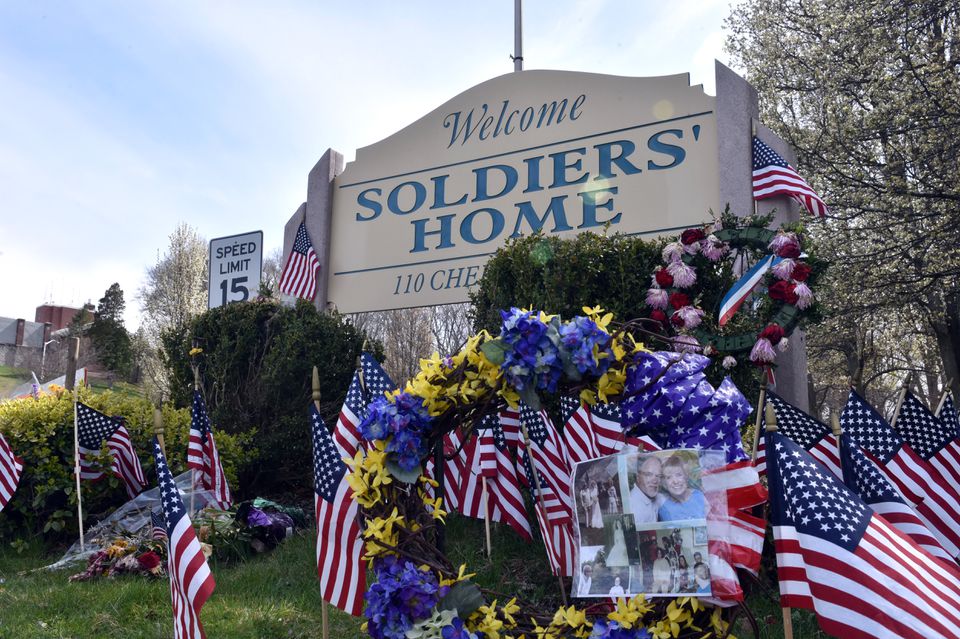
The state Senate voted unanimously Thursday to approve a $56 million settlement with families of victims in the 2020 COVID-19 outbreak at the Soldiers’ Home in Holyoke.
Also Thursday, the House of Representatives passed a bill aimed at helping military spouses get professional licenses and military children access schools here. These are accommodations that could help bring the Air Force’s newest F-35 fighter jets to Barnes Air National Guard Base in Westfield.
The settlement bill was previously passed by the House and it’s now on its way to Gov. Charlie Baker, said state Sen. John C. Velis, D-Westfield.
Baker announced the settlement in May. It follows nearly two years after plaintiffs filed a $176 million class action lawsuit in federal court against state officials and ousted leaders of the soldiers’ home.
Velis, whose district includes Holyoke, was the only senator to speak on the bill Thursday.
“No amount of money will ever make up for the devastating loss and heartbreak that these families have been through. What happened at the Home was unacceptable and will forever leave a scar on the Commonwealth, especially our Western Mass communities,” said Velis, chairman of the Veterans’ Committee. “No dollar figure will ever bring these families their loved ones back. That anguish and grief will always be there, but this settlement does ensure that the families no longer need to suffer the painful and long process of continued litigation.”
The outbreak killed 84 veterans and infected dozens more. The tragedy spurred plans now underway for a new $400 million facility, as well as governance reforms still pending before the Legislature.
The licensing bill, called the SPEED Act, will help the families of military members transferred not just to Barnes but to anywhere in Massachusetts.
“Anyone who has worn the uniform or has a family member who has worn the uniform knows that the sacrifice of military service goes far beyond the individual service member,” said Velis, an Army reservist. “The SPEED Act is a recognition of that sacrifice and the challenges these families face. The bill will benefit so many military families coming to our state and will help bring massive federal investments to our Commonwealth.”
The Pentagon looks for assurances like those in the SPEED act when deciding where to send investments and people. Holdups in school enrollment or in a spouse getting a license to teach or practice other professions make people leave the service, and the military wants to cut down on that.
State Rep. Kelly Pease, R-Westfield, spoke on the House Floor Thursday.
“After 20 years on active duty in the Army, I know that this bill helps not only the veterans but their families and the sacrifices a family makes; it’s not an easy chore when they’re sitting at home while their soldier — male or female — is gone for six months or a year and they’ve got to take care of everything at the house,” Pease said, according to the State House News Service.
Westfield is competing with Fresno Yosemite Airport in California and Naval Air Station Joint Reserve Base New Orleans for the new planes. A decision is expected near the end of the calendar year.
In June, U.S. Rep. Richard Neal led a delegation to meet with the secretary of the Air Force and explain what a welcoming community Westfield is. The group included Baker and U.S. Sens. Elizabeth Warren and Ed Markey and U.S. Reps. Seth Moulton, D-Salem, Jake Auchincloss, D-Newton, and Stephen Lynch, D-Boston.
The House version of the SPEED Act will likely go back to the Senate for more work because the House version is different. One significant change is a House proposal to allow veterans clubs to host slot machines.
The House bill also includes a Velis proposal that would support the estimated more than 3.5 million Veterans who have been exposed to toxic burn pits.
It would provide help to Massachusetts veterans so they could register with the U.S. Department of Veterans Affairs burn pit database, making them eligible for increased health care services and provide them with compensation if they have health conditions related to the toxic exposure.
“Burn pits is to my generation of Veterans what Agent Orange was to Vietnam Veterans, and it is time that we acknowledge the serious and long-lasting health effects these toxins have,” Velis said. “I have been advocating for this bill since my own time in Afghanistan and am grateful that the House has taken these important steps today for our service members and their families.”
___
© 2022 Advance Local Media LLC
Distributed by Tribune Content Agency, LLC.